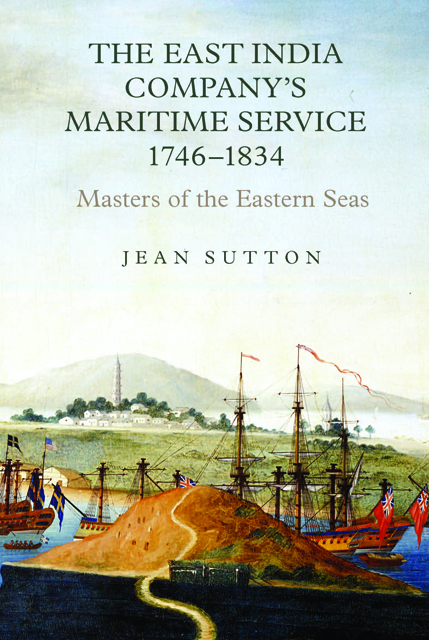Book contents
- Frontmatter
- Contents
- List of Illustrations: plates and maps
- Dedication
- Preface
- Larkins Family Tree
- Introduction
- Part I In the Company’s Service
- Part II William Larkins, Commander and Managing Owner
- Part III Thomas Larkins, Commander and Managing Owner
- Part IV John Pascall Larkins, Esq., Managing Owner
- Part V The New World Disorder
- Conclusion
- Appendix I
- Appendix II
- Bibliography
- Glossary
- Index
11 - An Event Unique in the Company’s History
Published online by Cambridge University Press: 18 February 2023
- Frontmatter
- Contents
- List of Illustrations: plates and maps
- Dedication
- Preface
- Larkins Family Tree
- Introduction
- Part I In the Company’s Service
- Part II William Larkins, Commander and Managing Owner
- Part III Thomas Larkins, Commander and Managing Owner
- Part IV John Pascall Larkins, Esq., Managing Owner
- Part V The New World Disorder
- Conclusion
- Appendix I
- Appendix II
- Bibliography
- Glossary
- Index
Summary
NATHANIEL DANCE, with William Pascall Larkins as first mate, had already sailed on Earl Camden before Thomas returned on Comet. The Chairs had backed John's efforts to get Nathaniel on his feet by offering him one of the most profitable voyages: Bombay and China. In a bid to get a share in the profitable trade exporting Gujarati raw cotton to Canton, the Company stationed four large China ships annually for the west coast Presidency and China. Any part of the Company's allocation that it could not fill was auctioned in Bombay by public notice among the private merchants there, the commanders being allowed to participate. When Captain Dance went ashore to the Fort in Bombay on 17 May 1803 he found a far more confident and prosperous community than that which he and Captain Larkins had met exactly twenty years earlier. The basis of this newfound prosperity could be seen all around. Towering above the roofs round the docks were the tops of the cotton screws which compressed the raw cotton into bales. Of the leading inhabitants whose hospitality Nathaniel enjoyed, the most important was Charles Forbes, whose great mansion stood in a street named after him. He fulfilled the role played earlier by David Scott as banker to the government, paying the Company's advances to the producers and weavers in the cotton producing areas.
For more than a decade the threat of demotion from a Presidency to a commercial factory, with sub-factories at Surat and Tellicherry, all subordinated to Madras, had hung over the heads of the Bombay merchants and government. Henry Dundas had eventually succeeded in convincing Wellesley that the Company's commercial viability depended on the rich cotton producing areas to the northward of Bombay. The Governor-General was, however, deaf to pleas to keep Malabar. He was disgusted by the private merchants’ exploitation of those ports since 1793 for their own profit, resulting in a grand rebellion of the rajahs. Following the death of Tipu Sultan during the capture of Seringapatam in 1799, Wellesley had removed the Malabar coast from Bombay's government and handed it over to Madras, forbidding the Bombay merchants to trade there.
- Type
- Chapter
- Information
- The East India Company's Maritime Service, 1746-1834Masters of the Eastern Seas, pp. 207 - 223Publisher: Boydell & BrewerPrint publication year: 2010

